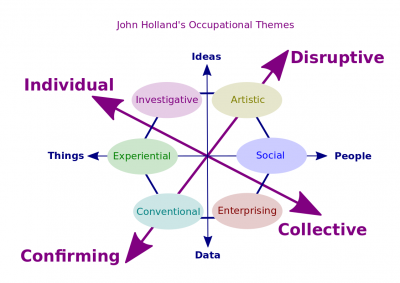Difference between revisions of "Occupational Interests"
(→Script) |
|||
| (40 intermediate revisions by 2 users not shown) | |||
| Line 1: | Line 1: | ||
| − | [[Occupational | + | [[Occupational Interests]] (hereinafter, the ''Lectio'') is the second [[lectio|lesson part]] of the '''[[Nature of Occupations]]''' [[lesson]] that introduces its participants to [[occupation]]s and related topics. |
| − | [[File:Educaship-pipeline.png|400px|thumb|[[WorldOpp Pipeline]]]]This ''lesson'' belongs to the [[Introduction to Employment]] session of | + | [[File:Educaship-pipeline.png|400px|thumb|[[WorldOpp Pipeline]]]]This ''lesson'' belongs to the [[Introduction to Employment]] session of [[EmployableU Concepts]]. |
==Content== | ==Content== | ||
| − | The predecessor [[lectio]] is [[ | + | The predecessor [[lectio]] is [[Personalities and Work]]. |
| − | + | [[File:Holland-themes.png|400px|thumb|[[Holland Occupational Themes]]]] | |
| − | |||
| − | |||
| − | |||
| − | |||
| − | |||
| − | |||
| − | |||
===Script=== | ===Script=== | ||
| − | : | + | :In the [[Holland Occupational Themes]], a carpenter, [[engineer]], farmer, [[operator]], [[technician]], [[tester]], and [[trades worker]] are [[realistic occupation]]s. They deal with real-world things, handle hands-on problems, and find practical solutions. In ancient times, they would have been best growers; today, they may be called "doers." |
| + | |||
| + | :An auditor, [[business analyst]], [[compliance officer]], [[cost estimator]], [[editor]], inspector, [[interviewer]], and lawyer belong to [[investigative occupation]]s. They work with [[idea]]s. They search for facts and figure out problems mentally. In ancient times, they would have been best shamans; today, they may be called "thinkers." | ||
| + | |||
| + | :An artist, composer, creative writer, and designer represent [[artistic occupation]]s. They work with forms, designs, and patterns. Their work require self-expression, often, without clear rules. In ancient times, they would have been best artisans; today, they may be called "innovators." | ||
| − | + | :A [[career counselor]], [[job coach]], [[mediator]], sales representative, [[service worker]], and teacher are [[social occupation]]s. They work with and communicate with other people. They often help or provide service to others. In ancient times, they would have been best healers; today, they may be called "helpers." | |
| − | : | ||
| − | + | :A [[c-level executive]], [[entrepreneur]], and [[product owner]] belong to [[enterprising occupation]]s. They start up and carry out [[project]]s. They may or may not lead people, but they have to take risks and make decisions. Collectively, they may be called "visionaries" and "creators." | |
| − | : | ||
| − | + | :An [[accountant]], [[assistant]], [[bookkeeper]], [[clerk]], [[document management specialist]], and technical writer represent [[conventional occupation]]s. They follow the set procedures and routines. They work with data and details more than with ideas. Usually there is a clear line of authority to follow. In ancient times, they would have been best guardians; today, they may be called "organizers." | |
| − | : | ||
| − | + | ===Key terms=== | |
| − | : | + | :[[Holland Occupational Themes]], [[realistic occupation]], [[investigative occupation]], [[artistic occupation]], [[social occupation]], [[enterprising occupation]], [[conventional occupation]], [[occupational interest]] |
| − | + | ===Closing=== | |
| − | : | + | :Do you target any particular [[occupational interest]] for your future work? --Yes/No/Let's move on for now |
| − | + | '''[[Core Occupations]]''' is the successor [[lectio]]. | |
| − | |||
| − | + | ==Questions== | |
| − | |||
| − | |||
| − | |||
| − | == | + | ===Placement entrance exam=== |
Latest revision as of 21:31, 29 October 2023
Occupational Interests (hereinafter, the Lectio) is the second lesson part of the Nature of Occupations lesson that introduces its participants to occupations and related topics.
This lesson belongs to the Introduction to Employment session of EmployableU Concepts.
Content
The predecessor lectio is Personalities and Work.
Script
- In the Holland Occupational Themes, a carpenter, engineer, farmer, operator, technician, tester, and trades worker are realistic occupations. They deal with real-world things, handle hands-on problems, and find practical solutions. In ancient times, they would have been best growers; today, they may be called "doers."
- An auditor, business analyst, compliance officer, cost estimator, editor, inspector, interviewer, and lawyer belong to investigative occupations. They work with ideas. They search for facts and figure out problems mentally. In ancient times, they would have been best shamans; today, they may be called "thinkers."
- An artist, composer, creative writer, and designer represent artistic occupations. They work with forms, designs, and patterns. Their work require self-expression, often, without clear rules. In ancient times, they would have been best artisans; today, they may be called "innovators."
- A career counselor, job coach, mediator, sales representative, service worker, and teacher are social occupations. They work with and communicate with other people. They often help or provide service to others. In ancient times, they would have been best healers; today, they may be called "helpers."
- A c-level executive, entrepreneur, and product owner belong to enterprising occupations. They start up and carry out projects. They may or may not lead people, but they have to take risks and make decisions. Collectively, they may be called "visionaries" and "creators."
- An accountant, assistant, bookkeeper, clerk, document management specialist, and technical writer represent conventional occupations. They follow the set procedures and routines. They work with data and details more than with ideas. Usually there is a clear line of authority to follow. In ancient times, they would have been best guardians; today, they may be called "organizers."
Key terms
- Holland Occupational Themes, realistic occupation, investigative occupation, artistic occupation, social occupation, enterprising occupation, conventional occupation, occupational interest
Closing
- Do you target any particular occupational interest for your future work? --Yes/No/Let's move on for now
Core Occupations is the successor lectio.

